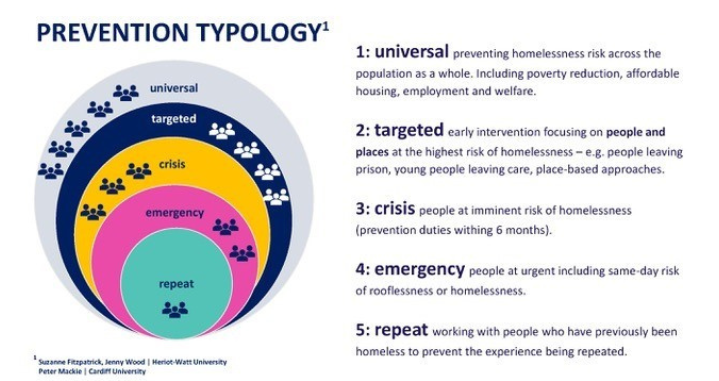At Turning Point Scotland, we have led by example to engage and influence our sector in tackling stigmatising language associated with all of our areas of support in social care. But we realised that some of the language we used to describe our Homelessness services needed careful updating.
At Turning Point Scotland, we have led by example to engage and influence our sector in tackling stigmatising language associated with all of our areas of support in social care. But we realised that some of the language we used to describe our Homelessness services needed careful updating.
We looked to the 5 stage typology, a tool that’s becoming widely used to assess policy and practice in the homelessness and prevention space. This helped us reframe how we viewed, and named our work.

We already knew that people don’t neatly fit into categories, but what we also realised was the extent to which our supports cover preventative measures. We don’t just work with people at the point of Homelessness. We also work, to a great extent, with people who are at risk of Homelessness. That means supporting people that are very far upstream who don’t even see themselves at risk of Homelessness, but who do need some support to protect their home.
With this in mind we took the decision to rename our work going forward. Instead of simply ‘Homelessness’ we now refer to our provisions as ‘Homelessness and Prevention’ services. This demonstrates our commitment to ensuring that people are given the highest levels of support to prevent them from becoming homeless in the first place.
We still see value in referring only to ‘Homelessness’ at the point at which it is experienced and tackled. However, it was important for us at Turning Point Scotland to reframe the language around the way we work, to best reflect what we actually do.
Language matters, it is a strong indicator of our purpose and of our dedication to that upstream work. The more we can support people in the prevention of homelessness, the less disrupted their lives become.
Reframing our language is only the first step. We will now move from this to rolling out increasingly focused work to ensure we are doing our utmost to live up to it. It sets our intention to continue to do what we do well in prevention, but also to double down on those efforts, ensuring the people we support stay rooted in their communities living meaningful and fulfilling lives.
Nicky Miller, Head of Homelessness and Prevention.

